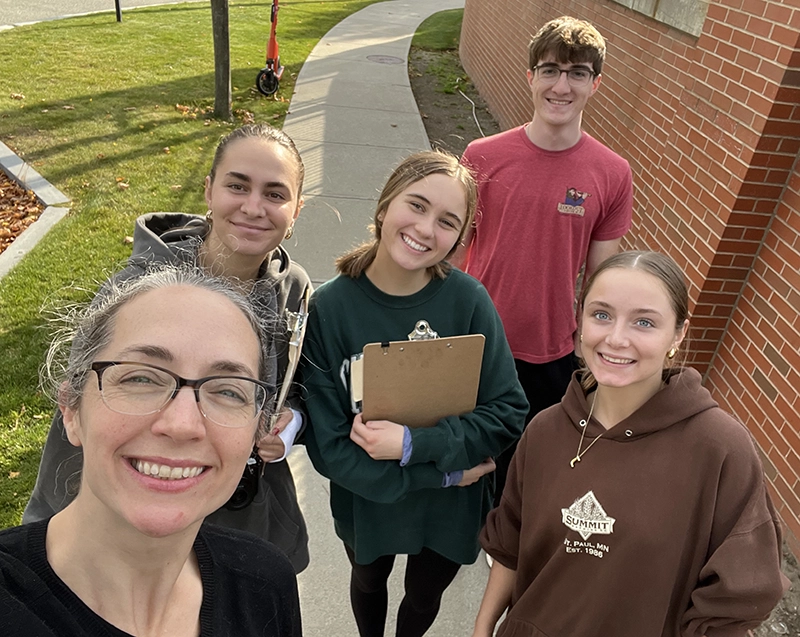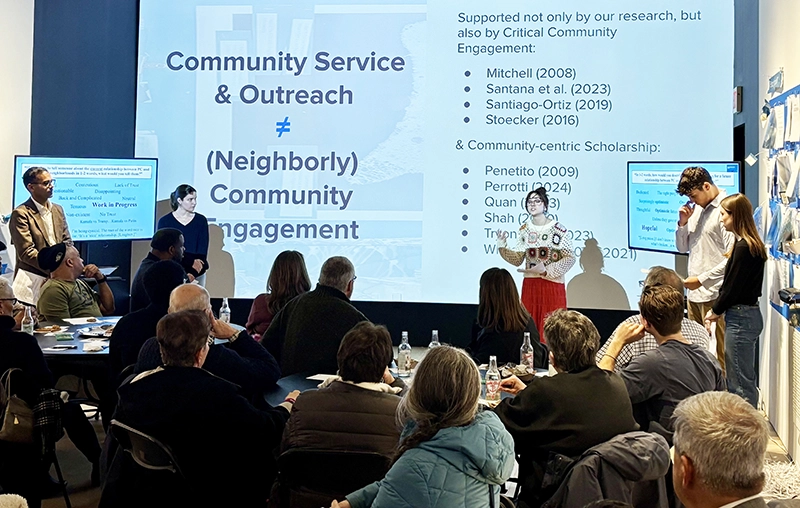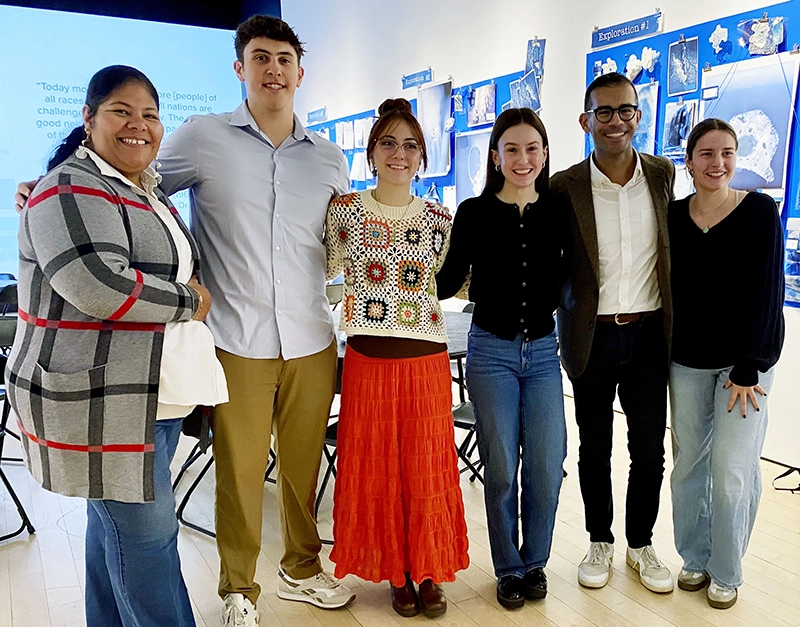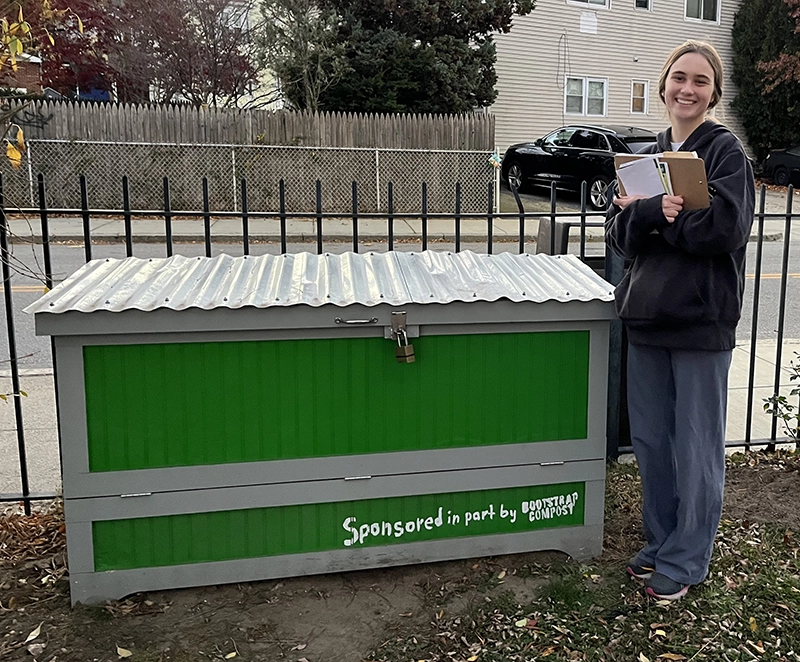
Courses take students into the neighborhood to build relationships, encourage environmentalism
By Martha Young
Providence College students and faculty engaged with the local community through two courses in the fall semester aimed at fostering mutual understanding and collaboration. The courses — one focused on what it means to be a good neighbor and the other on the benefits of composting — demonstrated the benefits of service-learning and community engagement on students and Providence neighbors.

Community-engaged research
Equitable community-campus relationships, specifically how community members define neighborly principles and practices in higher education, was the focus of Community-Engaged Research, a course taught by Carmine Perrotti, Ph.D. ’11, assistant professor of public and community service studies.
Through in-depth interviews with 15 residents and by attending more than 50 hours of community meetings and events in the neighborhoods surrounding PC, Perrotti and his students in the Neighborly Engagement Research Lab immersed themselves in researching PC’s relationships with its neighbors.
A presentation of the preliminary findings was shared at a public event entitled “Neighborliness: EXPANDing Community Relationships,” held at the Reilly Gallery in the Smith Center for the Arts on December 4, 2024. The event was hosted by PC Galleries and the Neighborly Engagement Research Lab and co-hosted by PC’s Center for Engaged Learning, Department of Art and Art History, Department of Public and Community Service Studies, the Feinstein Institute for Public Service, and the Office of Public Affairs, Community and Government Relations.
Attracting nearly 70 attendees, including more than 20 residents, the gathering was “huge success for various reasons, including welcoming our neighbors to campus, highlighting the Reilly Gallery as an accessible public space on campus, and for the opportunity for students to share the research we’d been working on during semester,” Perrotti said.
The presentation highlighted key themes and findings, including residents’ appreciation for PC’s community work, but emphasized a call to foster more tangible community-campus relationships through a sustained presence and two-way communication that creates opportunities to engage decision-makers in the community and on campus.

Riley Londraville ’27, from Ludlow, Massachusetts, a public and community service studies and English/creative writing double major, was one several students who noted that residents were eager to have their voices heard.
“Residents were very open to sharing the experiences they had lived for years,” added Katherine LaDuke ’27, from Millis, Massachusetts, a public and community service studies major and communications minor.
“Our event at the Reilly Gallery was a small step toward larger change and hopefully a greater implementation of community voice and presence on campus,” said Miranda Macaluso ’26, from Wakefield, Massachusetts, a biology major and a public and community service studies community health minor.
Chase Quigley ’26, from Topsfield, Massachusetts, a public and community service studies and political science double major, said, “Community members voiced during and after the event that they felt really hopeful about the future of community-campus relationships in light of our research, which was really inspiring to hear.”
In April 2025, Perrotti and his students will present their research at Compact25, a national conference focused on the role of higher education in building healthy communities.
Canvassing for community composting

In a separate initiative, Charlotte Roberts, Ph.D., assistant professor of sociology, engaged her Environmental Sociology students in a canvassing project of PC neighbors to increase residential participation in community composting.
The team of student volunteers worked with Zero Waste Providence, a local sustainability organization, on an 18-month outreach campaign in partnership with the city of Providence with funding from the U.S. Department of Agriculture.
In total, the students knocked on 900 doors, providing residents with information about composting options, including backyard composting, free and low-cost drop-off sites at community libraries in Providence, and curbside pick-up services.
“I’m very proud of the collective efforts our students made in this service-learning project,” Roberts said. “Together, they helped to slow the rate of additions to our landfill by composting more food waste.”
Margaret “Maggie” McCormick ’27, a social science major from Ipswich, Mass., said she “enjoyed the service-learning aspect of this class” and added that working with Zero Waste Providence helped her “bridge what we learned in the classroom with real-world application.”
“This not only reinforced my understanding but also deepened my passion for environmental policy,” she said.
McCormick looks forward to bringing the knowledge and experience she gained working on the project to PC’s campus. She said she is especially interested in increasing usage of the composting bin at Raymond Dining Hall.
“As a member of ECOPC (PC’s environmental club), I hope to incorporate a larger focus on composting initiatives, raising awareness about food waste, and encouraging greater participation in composting across campus,” she said.





